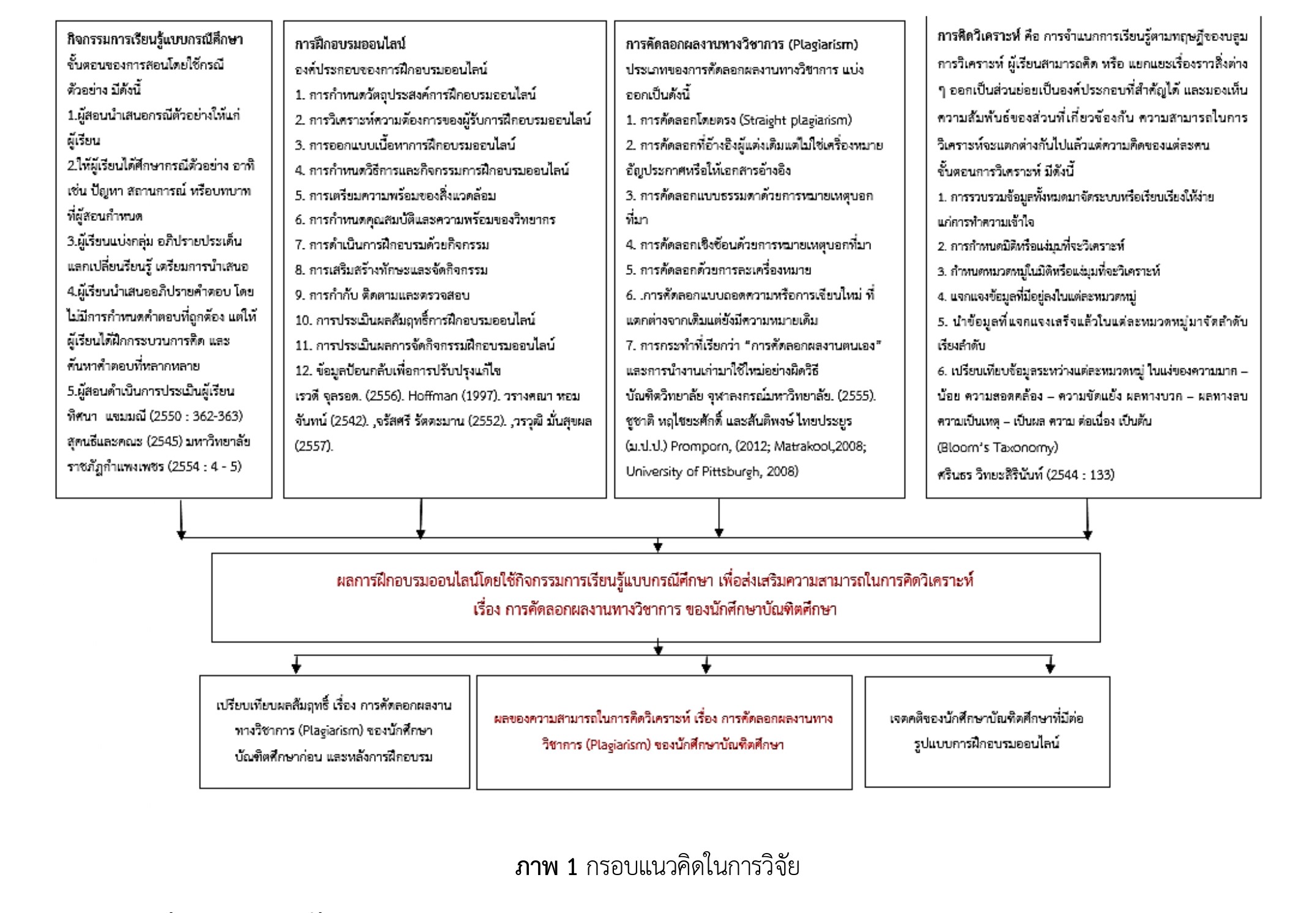The results of online training using case-based learning activities to enhance analytical thinking skills regarding academic plagiarism among graduate students
DOI:
https://doi.org/10.14456/psruhss.2024.51Keywords:
Case study, Plagiarism, Online-training, Critical thinkingAbstract
This research aims to achieve the following objectives: 1) To compare the training achievement on academic plagiarism among graduate students before and after online training. 2) To compare the analytical thinking abilities regarding academic plagiarism among graduate students. 3) To study the attitude of graduate students towards online training. The research sample consists of doctoral students majoring in educational administration, enrolled in the second semester of the academic year 2023, totaling 36 students in one classroom. The sample group was determined using simple random sampling. The research tools used in this study include: 1) Online training needs assessment survey. 2) Structured interview questionnaire (content and online training aspects). 3) Online training system. 4) Assessment questionnaire for analytical thinking abilities. 5) Learning achievement test to measure learning effectiveness. 6) Attitude assessment questionnaire for students towards online training. The results revealed that: Academic performance after the training ( = 15.72, S.D. = 2.52) was significantly higher than before the training (
= 12.53, S.D. = 2.70) at the .01 level of statistical significance. Analytical thinking skills after the training (
= 24.58, S.D. = 2.88) were significantly higher than before the training (
= 16.17, S.D. = 3.56) at the .01 level of statistical significance, using case-based learning activities. Student attitudes toward online training were at the highest level (
= 4.64, S.D. = 0.20), reflecting a high level of acceptance and satisfaction with the training approach.
References
Chokworrakul, S. (2023). Guidelines For Disciplinary Action In Case of Plagiarism of Academic Works Government Teachers And Educational Personnel In Educational Institutions Of Local Government Organizations. Jayaphruekpirom Journal., 6(1), 14-36. (in Thai)
Chompukoth, C., Panich, W., & Ruckbumrung, T. (2022). THE DEVELOPMENT OF AN E-LEARNING ON COMPUTER SYSTEMS IN INFORMTION TECHNOOG AND COMMUNICATION COURSE FOR STUDENTS WITH PHYSICAL DISABILITIES (TYPE 3) UNDER THE PRIVATE COLLEGES OF THE EASTERN REGION. Journal of Graduate School Sakon Nakhon Rajabhat University, 19(84), 91-101. (in Thai)
Faculty of Management Science, Rajabhat Suan Sunandha University. (2014). Teaching Management to Develop Desirable Graduate Attributes to Support the ASEAN Economic Community. [Online] Retrieved June 24 2021, from http://km.ssru.ac.th/V2014/kb_upload/file/BAC%20TEAM/manual.pdf
Graduate School, Chulalongkorn University. (2012). Plagiarism The typing thesis, copying research results on 'Key Points to Know.”. [online]. Retrieved October 15 2022, from https://www.grad.chula.ac.th/download/files/Plagiarism.pdf
Hadkhuntod, P. (2020). Development of Analysis Teamwork Web-Based Learning Model to Enhance Analysis Thinking Ability and Teamwork for Undergraduate Students. Journal of Education Rajabhat Maha Sarakham University, 17(1), 171-180. (in Thai)
Kamani, T. (2007). Pedagogy: Knowledge Entities for Efficient Learning Process Design (6th Ed.). Bangkok: Chulalongkorn University.
Mansukpol, W. (2014). The development of E-training model using collaborative learning to enhance E-learning instructional design competency for instructors of higher education. Veridian E-Journal, 7(3), 784–799.
Muangpluem, W. (2017). “voiding Plagiarism Behavior among Graduate Students in the Bangkok Metropolitan Area: Its Psychosocial Antecedents and the Consequence Pride in Academic Research”. Journal of Behavioral Science for Development, 9(1), 193 – 210. (in Thai)
Ngamnin, S. (2022). “The Effect of Learning Management Based on CIPPA Model with Graphic Organizer to Promote Analytical Thinking Ability of Teacher Students”. Social sciences research and academic journal, 17(2), 137-150. (in Thai)
Siriprom, T. (2017). Strategiesto AvoidPlagiarism in Academic Writing: A Case Study of Master’s Students in Teaching English. Journal of Humanities, 4(2), 47-60. (in Thai)
Wibunma, P. (2024). CRIMINAL MEASURES TO RESOLVE ACADEMIC PLAGIARISM. Graduate Law Journal, 17(1), 88-116. (in Thai)

Downloads
Published
How to Cite
Issue
Section
License
Copyright (c) 2024 Humanities and Social Sciences Journal of Pibulsongkram Rajabhat University

This work is licensed under a Creative Commons Attribution-NonCommercial-NoDerivatives 4.0 International License.
Any articles or comments appearing in the Journal of Humanities and Social Sciences, Rajabhat Phibulsongkram University, are the intellectual property of the authors, and do not necessarily reflect the views of the editorial board. Published articles are copyrighted by the Journal of Humanities and Social Sciences, Rajabhat Phibulsongkram University.








